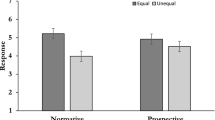Abstract
In 2008 Christopher Hardin and Alan Taylor published an article titled “Peculiar connection between the axiom of choice and predicting the future” in which they claim that if some system can be described as a function from a set of some instants of time to some set of states, then there is a way to predict the next value of the function based on its previous input. Using their so-called \(\mu \)-strategy one can randomly choose an instant t and the probability that the strategy is correct at t (i.e. that the output for a strategy for input t is exactly the same as the value of the function) equals 1. Mathematical aspects of this article are sound, but the background story about the correlation between theorems and philosophical aspects of predicting the future faces certain problems. The goal of my paper is to bring them up.
Access this chapter
Tax calculation will be finalised at checkout
Purchases are for personal use only
Similar content being viewed by others
Notes
- 1.
All proofs can be found in [4].
- 2.
Where \(\epsilon >0\) and \([t,t+\epsilon )\) is some small interval of time. For every t such \(\epsilon \) exists in the sense that given t we can match a suitable \(\epsilon \).
- 3.
The most popular one is the Blum-Shub-Smale (BSS) machine.
- 4.
There is no point to talk about the computability of \(\mu \)-strategy when it is defined on natural numbers because when time is not dense the strategy does not predict with probability 1.
References
Braverman, M., & Cook, S. (2006). Computing over the reals: Foundations for scientific computing. Notices of the American Mathematical Society, 53, 318–329.
Devlin, K. (1994). The joy of sets: Fundamentals of contemporary set theory. Berlin: Springer.
George, A. (2007). A proof of induction? Philosophers’ Imprint, 7(2), 1–5.
Hardin, C. S., & Taylor, A. D. (2008). A peculiar connection between the axiom of choice and predicting the future. American Mathematical Monthly, 115, 91–96.
Acknowledgements
I want to thank Rafal Urbaniak for his time and endless comments concerning this paper. I would also thank two anonymous referees, whose comments were very helpful. This research has been funded by Research Foundation Flanders (FWO).
Author information
Authors and Affiliations
Corresponding author
Editor information
Editors and Affiliations
Rights and permissions
Copyright information
© 2017 Springer International Publishing AG
About this chapter
Cite this chapter
Pawlowski, P. (2017). Philosophical Aspects of an Alleged Connection Between the Axiom of Choice and Predicting the Future. In: Urbaniak, R., Payette, G. (eds) Applications of Formal Philosophy. Logic, Argumentation & Reasoning, vol 14. Springer, Cham. https://doi.org/10.1007/978-3-319-58507-9_10
Download citation
DOI: https://doi.org/10.1007/978-3-319-58507-9_10
Published:
Publisher Name: Springer, Cham
Print ISBN: 978-3-319-58505-5
Online ISBN: 978-3-319-58507-9
eBook Packages: Religion and PhilosophyPhilosophy and Religion (R0)




